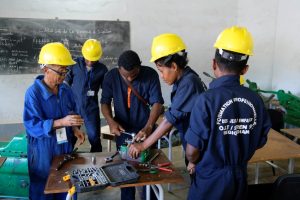Centre of Excellence for Leather (COEL) in Bangladesh (presentation)
Anglais
Autres sources
Des experts appartenant à de nombreuses agences internationales, régionales et nationales partagent généreusement leurs points de vue, leurs expériences et leurs conclusions en matière de compétences, aidant ainsi les décideurs politiques et autres intéressés à comprendre les liens entre l'éducation, la formation et le monde du travail et à intégrer les compétences dans la planification de développement national pour favoriser l'emploi et la croissance économique.

Accès à la formation

L'accès de tous à une éducation, une formation professionnelle et un apprentissage sur le lieu de travail de bonne qualité est un principe fondamental de la cohésion sociale et de la croissance économique. Certains groupes de personnes peuvent nécessiter une attention ciblée s'ils veulent bénéficier de l'éducation, de la formation et des possibilités d'emploi. C'est particulièrement le cas pour les jeunes défavorisés, les travailleurs peu qualifiés, les personnes handicapées et les habitants des communautés rurales. L'attrait de l'enseignement et de la formation professionnels est renforcé lorsqu'il est associé à une formation à l'entrepreneuriat et lorsque les politiques publiques encouragent l'utilisation des compétences avancées par les entreprises.
Anticiper les besoins futurs en compétences

Participation des partenaires sociaux

Le monde de la formation et le monde du travail sont distincts mais connectés. L'un dispense des compétences; l'autre produit des biens et des services. Mais aucun des deux ne peut prospérer sans l'autre. Des liens étroits entre le gouvernement, les employeurs et les travailleurs permettent de lier la pertinence des formations à l'évolution des besoins des entreprises et du marché du travail.
Documents promotionnels
Présentations, analyses, comptes-rendus de réunions, matériel promotionnel, vidéos, fiches techniques, brochures et bulletins d'information sur le développement des compétences au service de l'emploi.

Apprentissages
Commissions sectorielles pour les compétences
Industrie du cuir
Partenariats entre secteur public et secteur privé
Prévoir les besoins en compétences
Disparité dans les compétences
Femmes
Jeunesse
Bangladesh
Bangladesh has a strong track record of growth and development, even in times of elevated global uncertainty. A robust demographic dividend, strong ready-made garment exports, resilient remittance inflows, and stable macroeconomic conditions have supported rapid economic growth over the past two decades. A strong recovery from the COVID-19 pandemic continued in FY22, although a recent surge in commodity prices has presented new headwinds.
Bangladesh reached lower-middle income status in 2015. It is on track to graduate from the UN’s Least Developed Countries list in 2026. Poverty declined from 43.5 percent in 1991 to 14.3 percent in 2016, based on the international poverty line of $1.90 a day (1).
Like many of its Asian neighbours, Bangladesh faces a major challenge trying to develop modern, employability skills for tens of millions of young women and men. It has a large informal sector, which accounts for 94.7 percent of the total employment in 2017 (2). Youth continue to be highly affected by the lack of opportunities, with the share of youth aged 15-24 not in employment, education or training (NEET), estimated at 27.8 percent in 2020 (3).
TVET has a huge role to play in equipping the vast young labour force of 15-29 years referred to as the country’s “demographic dividend” with employability skills and providing enhanced support services to ensure a better transition from school to work. TVET may also contribute to reducing poverty by providing employability skills, particularly to those who drop out of school early and to a large number of unemployed and underemployed adults.
Despite many reform initiatives by the government, the TVET sector needs further strengthening through reform of policies and systems in the labour market. Enhancing industry-relevance of TVET qualifications will furthermore require closer Government cooperation with the private sector. For one and a half decade, the ILO has worked closely with the Government of Bangladesh and its Social Partners to reform the TVET sector and to improve access for people to increase their skills and employability, in particular youth, women and people from other marginalized groups.
The impact of the COVID-19 pandemic had detrimental effects on the TVET sector, due to the nation-wide closure of all educational institutes for one and a half years, starting on 17 March 2020. Most students’ learning was effectively abolished for this duration, and learning and certification was only possible through limited online learning facilities in existence at the time. Only recently has the TVET returned to its prior activity level.
The ILO landmark programmes aim to strengthen and improve the environment for industry skills development, address the mismatch between the supply and demand for skills training, and drive the increased employability of millions of young women and men. ILO’s support to develop the skills system in Bangladesh has focused on skills system governance, development of skills policies and qualifications frameworks; delivery of quality skills training, expanding access to TVET, and involvement by the private sector.
Sources
(1) https://www.worldbank.org/en/country/bangladesh/overview
(2) https://ilostat.ilo.org/topics/informality/
(3) https://ilostat.ilo.org/topics/youth/
Country Assessment and Priority (CAP) – Bangladesh strategy for skills and lifelong learning (2022)
Situation Analysis of Bangladesh TVET Sector (2019) https://www.ilo.org/wcmsp5/groups/public/—asia/—ro-bangkok/—ilo-dhaka/documents/publication/wcms_735704.pdf_